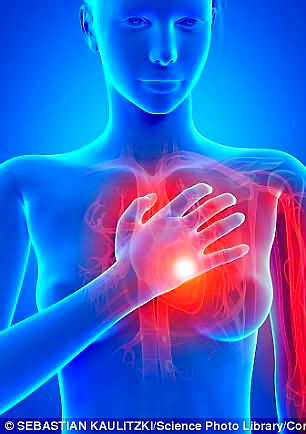Loneliness is 'AS deadly as a lack of exercise and diabetes': Poor social network 'drastically increases risk of heart disease, stroke and cancer'
♥ Being lonely increases your risk of heart disease and cancer, a study found
孤独会增加你心脏病和癌症的风险
♥ Scientists looked at the link between relationships and health at each age
科学家观察每个时代人际关系与健康之间的联系
♥ Loneliness when young is as dangerous as physical inactivity, they said
孤独和缺乏身体活动一样危险
♥ And, hypertension often stems from loneliness - not diabetes - in old age
高血压往往源于孤独而不是糖尿病及老年
♥ Thus, those who aren't lonely have a longer life expectancy, they said
因此,不孤独的人寿命更长
Feeling lonely can ‘vastly elevate’ a person's risk of heart disease, stroke and cancer, scientists warn.
Lacking a network of friends or family is as dangerous to your health as a lack of physical inactivity in youth or diabetes in old age, their research found.
Scientists from the University of North Carolina examined the association between relationships and healthiness across each life stage.
They determined that weak relationships in younger years can increase your risk of inflammation – at the same rate as lack of exercise.
Furthermore, hypertension in old age is more likely to occur as a result of loneliness than clinical risk factors, including diabetes.

Lacking a network of family or friends - and living a life of loneliness - has been found to increase your risk of heart disease, stroke and cancer, according to a new study
Yet, people who have the support of loved ones are less likely to develop health conditions – and more likely to have a longer life expectancy.
Dr Kathleen Mullan Harris, of UNC and the Carolina Population Center, said: ‘Based on these findings, it should be as important to encourage adolescents and young adults to build broad social relationships and skills for interacting with others as it is to eat healthy and be physically active.’
Previous studies found that aging adults live longer if they have more social connections.
The new study builds on that research – demonstrating how social relationships reduce the risk of poor health at each stage of life.
The size of a person’s social network is important for health in early and late adulthood.

People who have the support of loved ones were found to be less likely to develop health conditions – such as those that lead to heart problems – and thus have a higher life expectancy, according to the study
Social integration in adolescence was found to protect against abdominal obesity.
Researchers found body mass index (BMI) and waist circumference were higher among those with lower levels of social integration during adolescence.
And, in old age, social isolation can exacerbate a host of health problems, they said.
But, in middle adulthood, the number of social connections do not appear to matter as much as the level of support or strain they provide.
Dr Harris said: ‘The relationship between health and the degree to which people are integrated in large social networks is strongest at the beginning and at the end of life, and not so important in middle adulthood, when the quality, not the quantity, of social relationships matters.’
The scientists assessed data from four surveys of the US population that, collectively, covered the lifespan from adolescence to old age.
One of the four studies examined found that having a strong social base earlier in life led to a 54 per cent reduction in the chances of developing hypertension later.
Dr Yang Claire Yang, of UNC, CPC and the Lineberger Comprehensive Cancer Center said: ‘We studied the interplay between social relationships, behavioral factors and physiological dysregulation that, over time, lead to chronic diseases of aging – cancer being a prominent example.
‘Our analysis makes it clear that doctors, clinicians and other health workers should redouble their efforts to help the public understand how important strong social bonds are throughout the course of all of our lives.’
The study was published in the Proceedings of the National Academy of Sciences.




